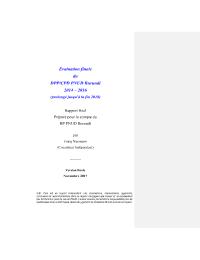
Evaluation a mi-parcours du Programme Pays (CPD) et son alignement au Strategic Plan 2014-2017
Output 1.1. National and sub-national systems and institutions enabled to achieve structural transformation of productive capacities that are sustainable and employment - and livelihoods- intensive
Output 1.3. Solutions developed at national and sub-national levels for sustainable management of natural resources, ecosystem services, chemicals and waste
Output 1.4. Scaled up action on climate change adaptation and mitigation across sectors which is funded and implemented
Output 1.5. Inclusive and sustainable solutions adopted to achieve increased energy efficiency and universal modern energy access (especially off-grid sources of renewable energy)
Output 2.1. Parliaments, constitution making bodies and electoral institutions enabled to perform core functions for improved accountability, participation and representation, including for peaceful transitions
Output 2.2. Institutions and systems enabled to address awareness, prevention and enforcement of anti-corruption measures across sectors and stakeholders
Output 2.3 Capacities of human rights institutions strengthened
Output 2.4. Frameworks and dialogue processes engaged for effective and transparent engagement of civil society in national development
Output 2.5. Legal and regulatory frameworks, policies and institutions enabled to ensure the conservation, sustainable use, and access and benefit sharing of natural resources, biodiversity and ecosystems, in line with international conventions and national
Output 2.6. Legal reform enabled to fight discrimination and address emerging issues (such as environmental and electoral justice
Output 3.1. Core functions of government enabled (in post conflict situations) to ensure national ownership of recovery and development processes
Output 3.2. Functions, financing and capacity of sub-national level institutions enabled to deliver improved basic services and respond to priorities voiced by the public
Output 3.5 Communities empowered and security sector institutions enabled for increased citizen safety and reduced levels of armed violence
Output 3.6. Governance institutional, and other critical bottlenecks addressed to support achievement of the MDGs and other internationally agreed development goals
Output 5.1. Mechanisms in place to assess natural and man-made risks at national and sub-national levels
Output 5.2. Effective institutional, legislative and policy frameworks in place to enhance the implementation of disaster and climate risk management measures at national and sub-national levels
Output 6.1. From the humanitarian phase after crisis, early economic revitalization generates jobs and other environmentally sustainable livelihoods opportunities for crisis affected men and women
Output 1.2. Options enabled and facilitated for inclusive and sustainable social protection
Output 3.4. Functions, financing and capacity of rule of law institutions enabled, including to improve access to justice and redress
Goal 1. End poverty in all its forms everywhere
Goal 9. Build resilient infrastructure, promote inclusive and sustainable industrialization and foster innovation
1.4 By 2030, ensure that all men and women, in particular the poor and the vulnerable, have equal rights to economic resources, as well as access to basic services, ownership and control over land and other forms of property, inheritance, natural resources, appropriate new technology and financial services, including microfinance
1.5 By 2030, build the resilience of the poor and those in vulnerable situations and reduce their exposure and vulnerability to climate-related extreme events and other economic, social and environmental shocks and disasters
9.4 By 2030, upgrade infrastructure and retrofit industries to make them sustainable, with increased resource-use efficiency and greater adoption of clean and environmentally sound technologies and industrial processes, with all countries taking action in accordance with their respective capabilities
1: Crisis Prevention & Recovery
2: Cross-cutting Development Issue
3: Democratic Governance
4: Environment & Sustainable Development
5: Others



The CPD 2012-2016 has been extended to 2017 and will be surely extended to 2018 in line with the UNDAF extention
Compte tenu des contraintes administratives de l'entrée au Burundi qui sont devenues de plus en plus longues et compliquées et en raison de la réticence de plusieurs experts à venir au Burundi en raison du contexte de crise, nous demandons que ce rapport d'évaluation soit terminé fin octobre 2017.